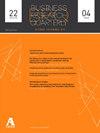CSR and corporate taxes: Substitutes or complements?
IF 3.4
4区 管理学
Q2 BUSINESS
引用次数: 4
Abstract
There is a debate in academia and the business world on whether tax payments should be considered part of firms’ social responsibility. Existing literature provides conflicting evidence on the relationship between corporate tax payments and corporate social responsibility (CSR). Borrowing a concept from a behavioral theory of the firm (BTOF), this study attempts to present a more refined model on the relationship between the two. The results in this study reveal that as firms’ performance rises further above their aspiration level, they are less likely to show better CSR performances and are also less likely to avoid taxes. Firms performing just above their aspiration level show higher CSR performances and firms performing nearby (both below and above) their aspiration level avoid more taxes. In conclusion, firms’ CSR and tax payment decisions are related to the desire to meet or beat an aspiration level or sustain competitive advantage than being ethical or unethical. JEL CLASSIFICATION M14; H26企业社会责任与公司税:替代还是互补?
学术界和商界都在争论纳税是否应被视为企业社会责任的一部分。现有文献对企业纳税与企业社会责任(CSR)之间的关系提供了相互矛盾的证据。本研究借用企业行为理论(BTOF)的概念,试图对两者之间的关系提出一个更精细的模型。本研究的结果表明,当企业绩效进一步高于其期望水平时,它们不太可能表现出更好的企业社会责任绩效,也不太可能避税。略高于其期望水平的企业表现出更高的企业社会责任绩效,而接近(低于或高于)其期望水平的企业则避免了更多的税收。总之,企业的企业社会责任和纳税决策与满足或超越期望水平或维持竞争优势的愿望有关,而不是道德或不道德。凝胶分类m14;H26
本文章由计算机程序翻译,如有差异,请以英文原文为准。
求助全文
约1分钟内获得全文
求助全文

 求助内容:
求助内容: 应助结果提醒方式:
应助结果提醒方式:


